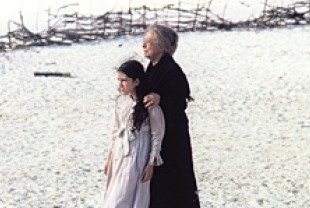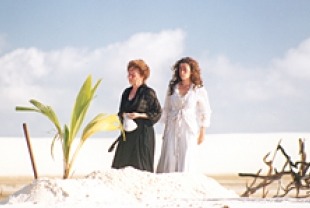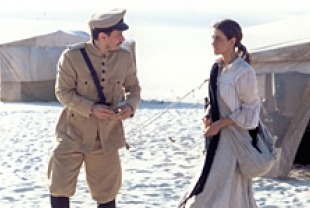In 1910, Vasco (Ruy Guerra) leads his wife Aurea (Fernanda Torres), her mother (Fernanda Montenegro), and a band of other settlers into a desolate and arid piece of land in Maranhao, northern Brazil. He has big dreams for this pioneer adventure. But Aurea is pregnant and worried about the quality of life in this barren place. Her mother is fearful, too. Faced with problems and some armed runaway slaves who live nearby, the settlers quickly abandon Vasco, who dies in an accident. Aurea and her mother manage to walk through the desert to an oasis by the water where they are given assistance by Massu (Luiz Melodia), a runway slave who remembers them.
They learn from him how to trade objects for food and as a result are able to take care of Maria when she is born. Nine years pass, and Aurea is still obsessed with escaping to civilization which she equates with music and fine clothes. But when Chico (Emiliano Queiroz), the salt salesman who was meant to provide her with passage out of this place, dies, she is bereft of hope.
Then she meets Lieutenant Luiz (Enrique Diaz), a guide leading a band of scientists who have come to this barren place to experience a total solar eclipse. In an evening with this stranger, Aurea brings to life her civilized self. He tells her that in 1919 an English expedition has come to the area to take astronomic measurements in order to prove Einstein's theory of relativity. Aurea doesn't care about any of that. After sex, Lieutenant Luiz promises to take her and her daughter away with him. But returning home to pack, she discovers that her mother is dead, and she never makes the rendezvous with Lieutenant Luiz.
Brazilian Andrucha Waddington directs this leisurely drama which covers three generations of women struggling in the wilderness and trying to make a place for themselves in an alien land. The making of the movie has been a family affair since Fernanda Montenegro and Fernanda Torres are mother and daughter in real life and in the story. In addition Ms. Torres is Waddington's wife. Much of the drama revolves around Aurea's desperate yearning to escape the wilderness. It is interesting to watch how this stubborn woman eventually lets go of her dream to return to civilization. However, she does make it possible for Maria to do so. It is a way of passing on her legacy to the one she loves most.
House of Sand is a well-acted and beguiling drama that makes the most of its desert images and references to outer space: in one scene Halley's Comet is spotted in the sky, and in another, a visitor to Aurea mentions that Apollo 11 landed on the moon.
Special DVD features include "The Making of The House of Sand."


